Before Coors and humidors, JAWS and WAR, Larry Walker was just a late-season call-up hoping to make a difference for his team. Walker’s career as it pertains to the Hall of Fame has been well-covered, but what was the conversation like 30 years ago when the young Canadian first appeared for the Montreal Expos?
Walker’s major league debut came versus the visiting San Francisco Giants on August 16th, 1989. We are able to watch the game today thanks to a video that combines parts of the CTV broadcast and the French-language CBC feed.
CTV’s presentation was fronted by David Van Horne and former Expos right fielder Ken Singleton. Note from the future: Singleton’s 127 OPS+ with Montreal would be more or less matched by Walker’s 128 figure with the club.
The lead story on the broadcast was Montreal’s decline in the divisional standings, the team having let a three game lead on July 24th turn into a four game deficit entering August 16th, with three National League East clubs passing Les Expos.
The visiting Giants were faring much better, the NL West leaders featuring the fearsome twosome of Kevin Mitchell and Will Clark. The “Pacific Sock Connection” were in the process of slugging their way to a one-two finish in the NL MVP race. CTV were obviously keen to catch up with the dynamic first baseman Clark. Let’s check in on that interview.
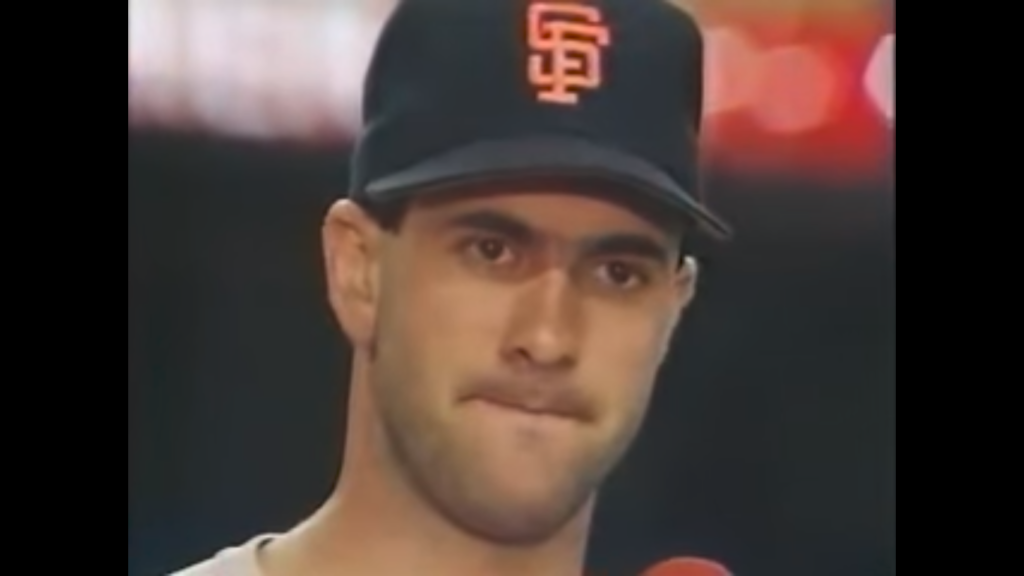
Pure charisma.
For the home team there was much anticipation about the debut of a 22-year-old from Maple Ridge, British Columbia. Larry Walker had been hoped to be the starting right fielder heading into the 1988 season, the youngster having put up impressive numbers in Single and Double-A ball. Those plans would drastically change in January of that year when Walker tore his right knee at home plate while playing winter ball in Mexico. The injury cost Walker the entire 1988 season, and Montreal would react by shifting two-time Silver Slugger shortstop Hubie Brooks to right field, a position Brooks maintained in 1989.
By the time of Walker’s Expos debut, Brooks’ production had dropped to levels that would be acceptable for a shortstop, but less so for a corner outfielder. The party line was that Walker and Brooks would be platooned for the rest of the season. Singleton speculated that Walker’s promotion could springboard Brooks into an improved performance. Expos manager Buck Rodgers hoped that Brooks would get jump started for the stretch run.
As for Walker, he was set to become the fifth Canadian to play for the Expos. His bat had played well at Triple-A, but arguably more important were his 36 stolen bases in Indianapolis, a figure that led the American Association and indicated a well-recovered right knee.
In a pre-game interview Walker revealed he was pretty tired from the travel but, echoing Crash Davis, “happy to be here”.
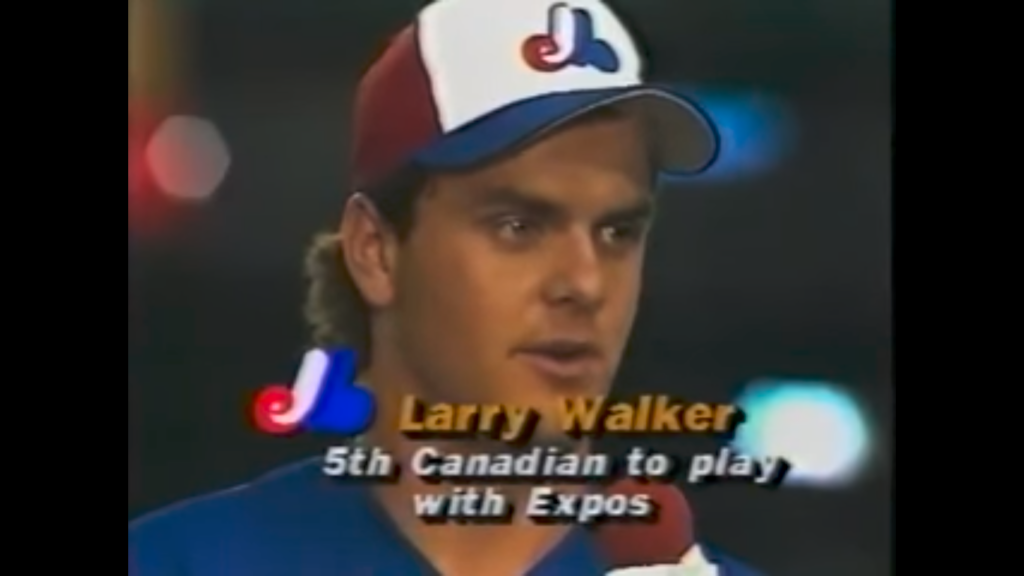
The feelgood story of Walker overcoming injury to reach the majors contrasted with the devastating events of the previous day’s game. San Francisco pitcher Dave Dravecky, who had undergone surgery to remove a cancerous tumor in his pitching arm the previous off-season, fractured his humerus while pitching to Tim Raines in just his second start back in the majors. It would be the final appearance of his baseball career.
With righty Mike LaCoss on the mound for San Francisco, Walker jumped straight into the lineup, batting sixth and manning right field. His first fielding opportunity was a simple corralling of a Will Clark single in the first inning. Before Walker came to the plate in the second inning, TV viewers were encouraged to answer the trivia question of the day…
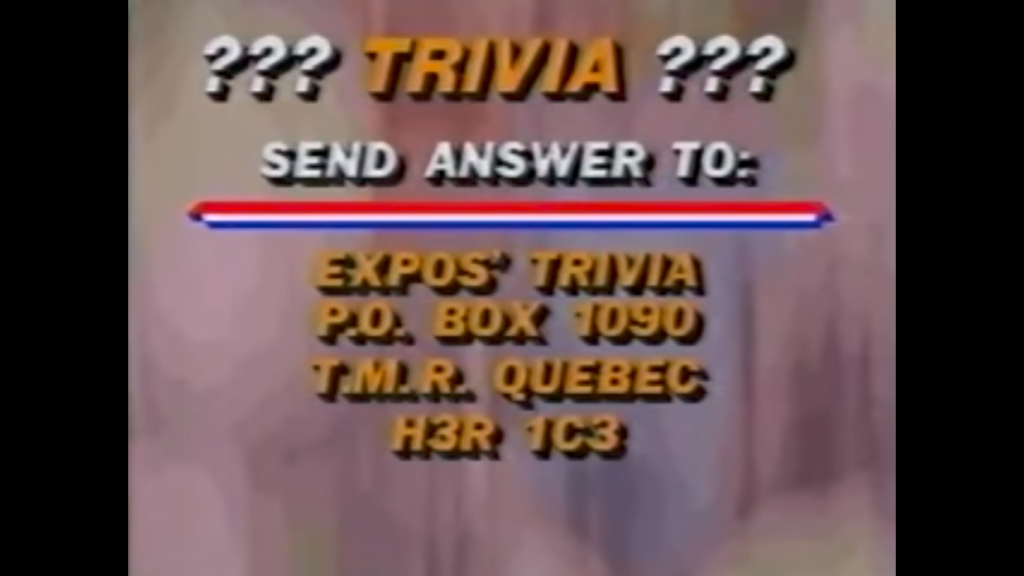
…by mail. The prize was a VHS tape. File this under things millennials wouldn’t understand.
A decent reception from the crowd greeted Walker. Ken Singleton and Dave Van Horne talked up Walker’s power-speed combo, noting that he was one of only four players with 20 home and 20 stolen bases in Double-A in 1987.
Facing LaCoss, Walker took the first pitch outside before swinging at four consecutive offerings, fouling off three and whiffing at one. Behind in the count 1-2, Walker then showed composure to take three consecutive balls, casually flipping his bat towards the dugout on his way to first. Van Horne noted that Walker had displayed the “patience of a veteran”.
Waiting for Walker at first base was Will “the Thrill” Clark. A perpetual MVP candidate beside the kid who had yet to hit a fair ball in the majors. Their careers would prove more similar than they might have imagined in that moment. Clark would finish with career figures of 8283 PA and a 137 OPS+ while Walker totaled 8030 PA and a 141 OPS+. Both players remained great hitters to the end and both would bow out of baseball after losing an NLCS with the St Louis Cardinals.
In that moment, with Walker standing at first for the first time in his career, it would have seemed so unlikely that Will Clark would appear on a solitary Hall of Fame ballot, while Walker would still be flirting with induction fourteen years after retirement.
Walker’s presence on the basepaths was not going unnoticed by San Francisco’s defense. LaCoss threw to first five times in the inning and manager Roger Craig, never adverse to pitchouts, put that play on with the count at 2-2 on Spike Owen. Walker was not to be caught out, but neither would he record a stolen base.
Kevin Mitchell led off the fourth inning for the Giants. Van Horne quoted Craig: “When [Mitchell] hits them, the outfielders don’t even move. Only the fans move.” In a literal sense, Craig’s dictum did not come true. Mitchell merely slugged a homer that center fielder Dave Martinez did chase, to a part of the stadium with no fan seating. Minor details. Mitchell had given the Giants a 1-0 lead.
In the bottom of the inning Walker got another chance to demonstrate the aptness of his name, working a 3-0 count, taking a called strike, then watching ball four go by for his second walk of the game. Singleton again praised Walker’s eye and patience at the plate. Still alert to the rookie’s ability on the basepaths, LaCoss threw to first twice in the subsequent at bat.
LaCoss had now issued five walks in the game but had yet to surrender a hit – a fact that Van Horne was happy to mention throughout the broadcast, no doubt incurring the wrath of social media users of the day. Montreal’s first hit finally came in the sixth inning, but to no run-scoring effect.
In the seventh Candy Maldonado repeated Mitchell’s lead-off home run stratagem, giving San Francisco a 2-0 lead. Walker was the first batter after the seventh inning stretch. In contrast to his previous plate appearances Walker jumped on the first pitch, sending the outside offering to left field for a lead off single and the first hit of his major league career. The home fans gave Walker a warm ovation. Will Clark was seen gesturing for the ball, the souvenir eventually arriving safely in the hands of Tim Wallach in the Expos dugout.
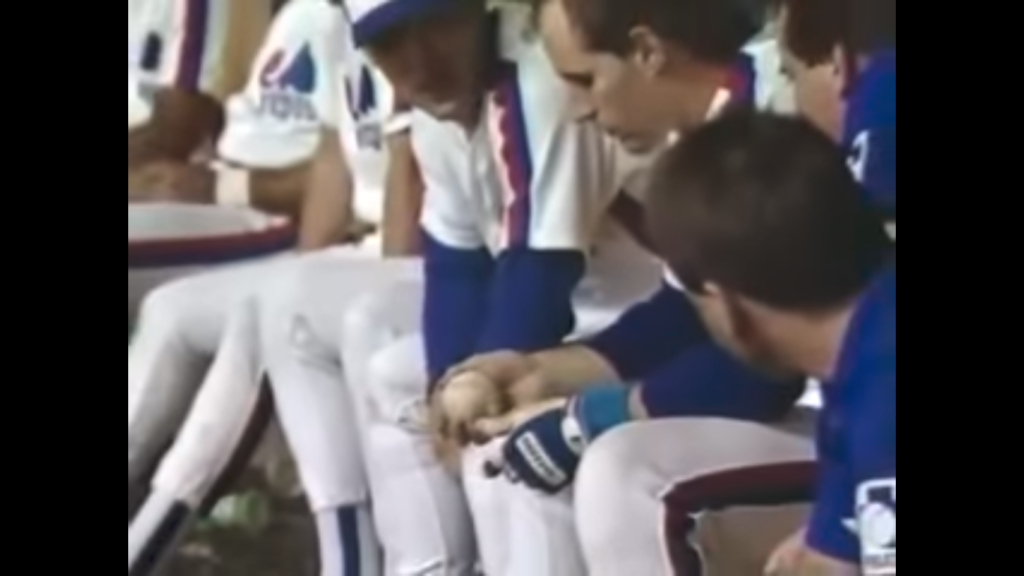
There was little time for self-congratulation on the part of Walker, as a passed ball immediately sent him to second. Two batters later he was singled home for the Expos’ first run of the game. High fives and attaboys followed.
Both halves of the eighth saw Walker playing a central role. With the game still a one-run affair and Kevin Mitchell on first, Matt Williams hit a line drive to right field. Unfortunately for the Giants, the ball headed directly for the rookie right fielder’s glove. Doubly unfortunately, Mitchell was rounding second base as the ball was caught, the hit-and-run play coming back to bite Roger Craig. Mitchell had been dissuaded from heading back to first through some excellent dekesmanship by second baseman Tom Foley.
Matt Williams, 23 going on 43, couldn’t believe it.
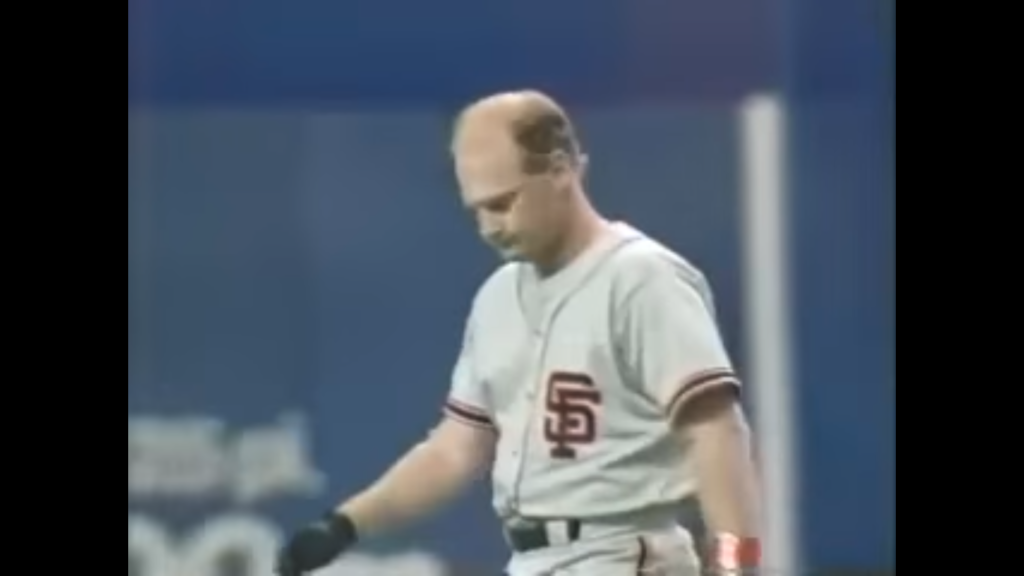
Down by one, the Expos rallied in the bottom of the eighth. Two quick outs were followed by a Raines double. Steve Bedrosian entered the game in relief. Wallach walked while Walker waited (try saying that even at normal speed), meaning two runners were on base for the debutant. On the second pitch of Walker’s PA, Raines did what Raines does and stole third. Walker again worked a 3-0 count, eventually walking on the sixth pitch of the plate appearance.
It was Walker’s fourth time on base in the game and he had yet to be put out. It was the first time in a quarter of a century that a National Leaguer had come to the plate at least four times in their debut and reached base on every occasion. Including Walker, this particular feat has only been achieved by 23 major leaguers since 1908 (most recently by Jay Bruce in 2008).
The bases were thus loaded for catcher Santovenia. A tense at bat looked to have ended disfavorably for the home side after Santovenia popped a shallow fly to center right. But Candy Maldonado misplayed his slide, the ball cannoning off his glove and beyond the immediate reach of center fielder Brett Butler.
Walker, running on the pitch, had been motoring around second as the error occurred, giving no indication that the brace worn around his right knee was giving him any issues. Walker beat the throw home, the bases now completely empty of its former occupants. Montreal had taken a 4-2 lead, and the attaboys and high fives were even more enthusiastic.
Montreal would close out the game in the ninth, Walker recording another simple putout in the process. As the team celebrated post-game, the camera lingered on the Expos newest star. A bullpen cart in the form of a boat passed by in the distance.
The win was Buck Rodgers’ 400th as Expos manager and doubled as a birthday present for the just-turned 51-year-old. Rodgers praised Walker performance, noting that the young man had every right to be nervous but had played a very good game. The French-language broadcast named Walker the Expos’ player of the game.
Walker’s debut was something of a false dawn, at least as far as 1989 was concerned. He started six of the team’s next seven games, all against right handed starting pitching. But in the final game of that stretch Walker went 1-7 in a 22-inning epic against the Dodgers. Walker made a great catch in that game, but was also called out for leaving third base early when attempting to score on a sacrifice fly, costing Montreal the win.
Walker was out of the starting lineup for the next game, despite a righty being on the mound, and would start only four games in September as Hubie Brooks went on a tear. Walker’s opening salvo of 6-9 with four walks would be drowned out by a 2-38 tailspin to close out the season.
The Expos slumped to a 81-81 record, going 16-27 after Walker’s call-up. Montreal kept their faith in the youngster, handing Walker the starting right field spot for 1990.
In a sense the rest is history, but with one more year of waiting to see if Walker will be elected to the Hall of Fame, that history continues to feel very present.

Nice reminiscence, Aidan. Walker’s game was one of only 11 career openers with three walks, the most recent by Jackie Bradley Jr, the third Red Sox outfielder with such a debut.
Dave Van Horne was the Expos announcer from the franchises’s inception and is still doing play-by-play for the Marlins; he turns 80 this season, his 51st in the majors.
What was the most notable first game hitting performance? A judgment call, doubtless, but Walker’s, considering his two critical runs scored, can’t be discounted.
The one many might choose, though, occurred in 1951, when a 24-year old rookie for the lowly Browns had a September call-up. Solo homer, two-run homer, groundout with a run scoring from third, forceout, single. He went on to bat .372 in 12 games, a spectacular but now all-but-forgotten debut by a player who hit .320 or higher three times and finished his career with a 132 OPS+.
nsb’s mystery man is the well-traveled Bob Nieman, whom the Browns traded away after the 1952 season, then re-acquired (with George Kell) after the team had relocated to Baltimore.
Another candidate for the best first career game is Mark Quinn. His 1999 debut for the Royals featured 2 HR, a double and 4 RBI in 4 trips. Despite his team losing that game, Quinn’s efforts rank 2nd in TB, 2nd in WPA and 9th in RE24 among all career debuts since 1908. The leaders in those categories are: for TB, J.P Arencibia (2010); for WPA, Maurice Van Robays (1939); and for RE24. Roy Weatherly (1936).
How about Russ Van Atta?
4 bits and a sacrifice in his debut… while pitching a shutout
https://www.baseball-reference.com/boxes/WS1/WS1193304250.shtml
Nice find.
After 1 game, a 0.00 ERA and a 1.000/1.000/1.000 slash.
My guess is that quite a few starting pitchers have opened their careers with a shutout or at least a 0.00 ERA. The four hits, though . . ..
https://www.baseball-reference.com/boxes/SLA/SLA195305060.shtml
here’s Bobo Hollomon’s no-hitter in his first major league start. He kind of got banged around in the 4 or 5 prior appearances in relief.Great idea – he can’t relieve, let’s start him
Great suggestions so far. I have to mention McCovey’s 4-4 with two triples debut. I hadn’t realized quite what a busy day on the bases it had been for him (and Mays in front of him) though.
AB #1: Bases empty single, with no further advance. Simple enough.
AB #2: With McCovey at the plate Mays steals second, and Eddie Bressoud scores from third when the catcher’s throw is wild. Mays is then thrown out trying to advance on the error, which ends the inning, so…
AB #2 redux: McCovey triples, and comes home on a fielders choice after the throw from second is misplayed by the catcher. (Rough day for Phillies catch Joe Lonnett, who was out of the majors at the end of the season).
AB #3: Mays is on second after singling home Bressaud and advancing on the throw. McCovey singles him home, goes to third on a Cepeda single and scores on a wild pitch. (Sloppy game from the Philles.)
AB#4: Mays doubles, advances on a passed ball (this just keeps getting worse) and then scores on McCovey’s triple. McCovey scores on a Daryl Spencer single.
https://www.baseball-reference.com/boxes/SFN/SFN195907300.shtml
McCovey’s 2nd PA (the one that didn’t count) reminds me of one that Harmon Killebrew had. Killer came to the plate with nobody out and Cesar Tovar on 3rd and Rod Carew on 1st. The two baserunners successfully executed a double steal, then Carew stole 3rd, and then he stole home. Killebrew ended up striking out with the bases empty. Ties record for most steals of home in a game, never mind in the same inning or the same AB.
https://www.baseball-reference.com/boxes/MIN/MIN196905180.shtml
Not sure about high fives, but probably a lot of attaboys that game, too.
John Paciorek, of course, had a 1.000/1.000/1.000 line in both his MLB debut, AND in his final game. Also, every game… because, you know… there was just the one. Scored four runs, too, along with 3 RBI. It was legit one of the best debuts AND finales in MLB history, even without it standing out as the weirdest one-game career, outside of Larry Yount’s.
Speaking of Larry Yount…
A.) It’s weird that both Paciorek and Yount are brothers of more famous major leaguers, and
B.) Larry Yount, of course, infamously is credited with 1 G pitched and no batters faced, no pitches nor pickoffs thrown. Last year, a reliever came in to intentionally walk a batter, but with the new rule, that meant not actually having to throw the baseball. Then he went out. I can’t remember who it was… but I immediately thought of Larry Yount. Of course, whoever it was is technically still credited with “facing” one batter, but still: it seems like Larry Yount finally has some company (kind of). It was someone established, though, so it’s not quite the same, but still.
It was Oliver Pérez. I think it came up in Baseball Reference’s newsletter recently.
https://www.baseball-reference.com/boxes/OAK/OAK201806290.shtml
Back then, the Astros had a ton of young talent and it seems they gave a lot of guys a chance before they were ready or they just wanted them to have a taste of the big leagues. Paciorek struggled to get out of A-ball and produced a .209/.334/.386 in 5-6 years in the minors.
Here are the players, since 1908, to get a walk-off hit or walk in their debut games.
Carlos Perez ……… 5/5/2015
Kyle Farmer ……… 7/30/2017
Ramon Laureano ……… 8/3/2018
Paul Janish ……… 5/14/2008
Miguel Cabrera ……… 6/20/2003
Josh Bard ……… 8/23/2002
Eric Owens ……… 6/6/1995
Tomas Perez ……… 5/3/1995
Kevin Seitzer ……… 9/3/1986
Curt Ford ……… 6/22/1985
Bob Pate ……… 6/2/1980
Sixto Lezcano ……… 9/10/1974
Billy Parker ……… 9/9/1971
Don Baylor ……… 9/18/1970
Cesar Tovar ……… 4/12/1965
Jack Hiatt ……… 1964-09-07 (2)
Maurice Van Robays ……… 9/7/1939
Jack Bolling ……… 1939-06-10 (1)
For Farmer, Ford, Pate, Hiatt and Tomas Perez it was their first ML PA.
Farmer’s game was the second highest leveraged and third highest WPA of any major league debut with positive WPA. The top 22 such highest leveraged games started as PH or PR appearances, and only one of those with more than one PA.
Pitcher Tim Conroy’s 101st career game was his first with a PA. He drew a 17th inning bases-loaded walk to force in the go-ahead run and then retired the side in order in the next half-inning to earn a 3 IP win. His aLI ranks #3 on the list if you count it as a career debut (as a batter).
Thanks for the great post! This game was really fun to watch almost 30 years later.
It’s amazing how much has changed in sports broadcasting since then. And how much hasn’t.
You mentioned Ken Singleton doing the color, and his prior service as an Expos’ right-fielder. RF is certainly one position that Montreal excelled at, with Walker preceded by Rusty Staub, Singleton, Gary Carter, Ellis Valentine, Warren Cromartie and Andre Dawson. And following Walker were Moises Alou and Vlad Guerrero. Not too shabby for a 36 year run (only other players with appreciable time at that position were one season each for Mitch Webster, Hubie Brooks, Tony Tarasco and Juan Rivera, and part of one season for Tim Wallach).